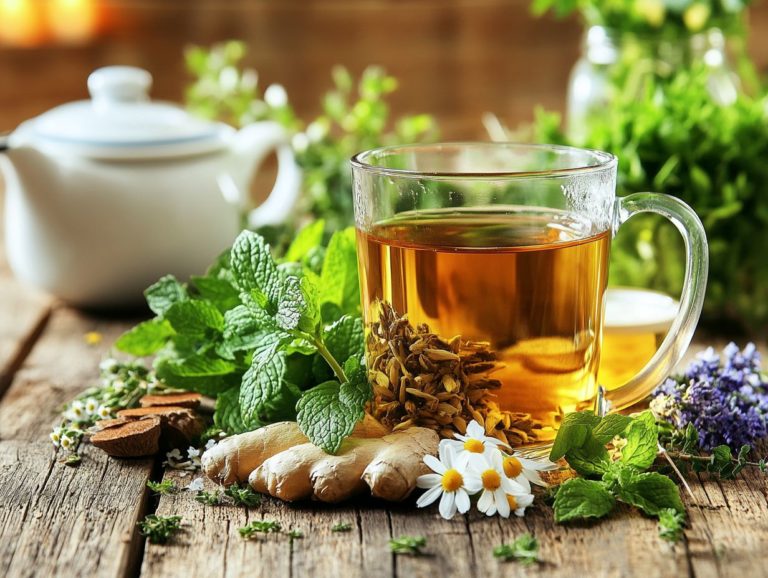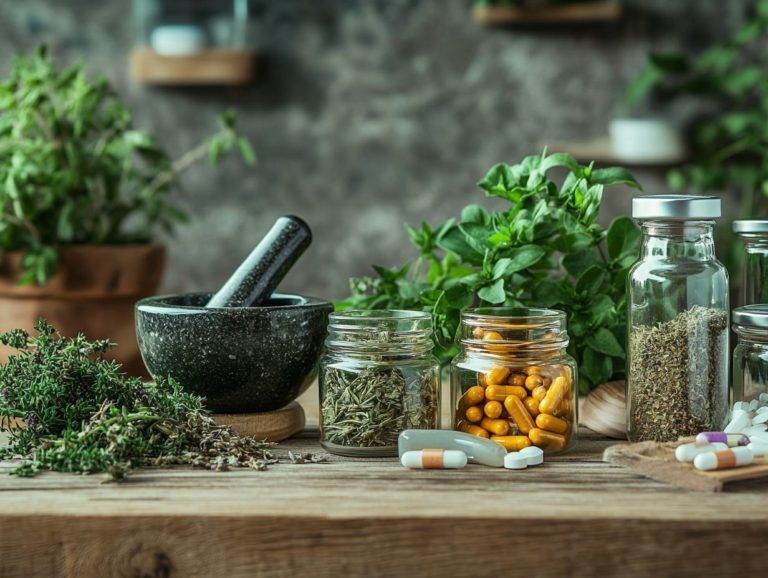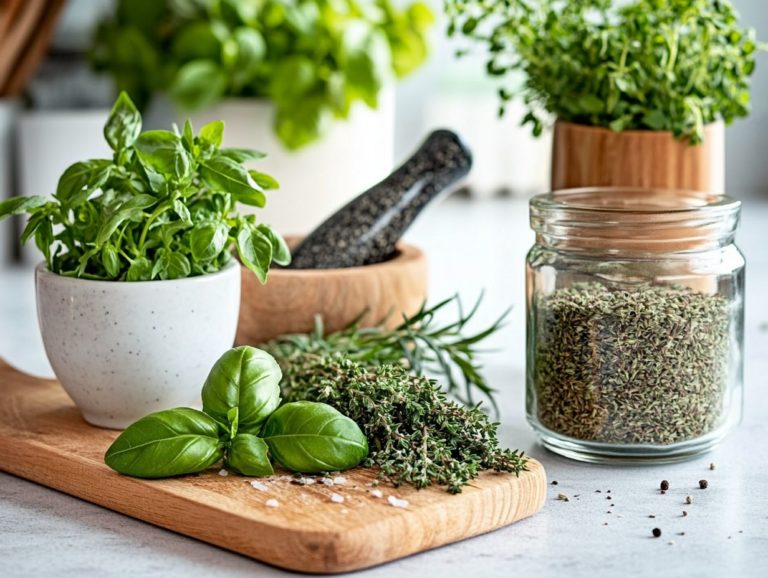What Are the Best Resources for Herbal Knowledge?
Herbal knowledge is a treasure trove of wisdom that can significantly enhance your health and well-being through the wonders of the natural world.
This article delves into a variety of resources available to you, whether you prefer books, online platforms, or engaging hands-on classes and workshops.
You ll also learn how to identify reliable sources, the numerous benefits of deepening your understanding of herbs, and practical strategies to retain the knowledge you acquire.
Start your exciting journey into herbalism today and transform your wellness approach!
Contents
- Key Takeaways:
- Types of Herbal Resources
- Choosing Reliable and Credible Sources
- Benefits of Learning Herbal Knowledge
- Tips for Retaining Herbal Knowledge
- Frequently Asked Questions
- What are the best resources for herbal knowledge?
- How can I find reliable information about herbs?
- Are there any online courses or workshops available for learning about herbs?
- Where can I find books about herbal knowledge?
- Can I trust information from online articles and blogs about herbs?
- How can I learn about herbs from experienced herbalists?
Key Takeaways:

- Expand your herbal knowledge through reliable and credible resources such as books, online sources, and classes/workshops.
- Consider factors like author qualifications and source credibility when choosing herbal resources.
- Learning herbal knowledge can bring numerous benefits, such as improving health and well-being; it’s important to practice and retain your knowledge through practical applications and techniques.
What is Herbal Knowledge?
Herbal knowledge involves understanding and applying herbal supplements and medicines to enhance your health and well-being. It includes the study of various natural products derived from plants, including well-known herbs like Echinacea, St. John’s wort, Ginkgo biloba, and garlic.
This knowledge is essential for practitioners of complementary therapies and individuals keen on integrating herbal remedies into their health routine.
Recognizing the significance of herbal practices is crucial, as they often serve as a bridge between traditional healing and contemporary medicine. The popularity of herbal supplements has surged recently, underscoring their role in preventive health and therapeutic interventions.
For instance, you might find Echinacea particularly useful for bolstering your immune system during cold and flu season, while St. John’s wort could be your go-to for alleviating mild to moderate depression.
Traditional studies of medicinal plants enhance our understanding by revealing the active compounds in these plants and how they function. This leads to evidence-based applications in modern healthcare.
Through ongoing research and compelling case studies like those examining Ginkgo biloba for cognitive enhancement it s clear that the connection between ancient wisdom and current medical practices is continually evolving.
Types of Herbal Resources
You have access to a rich variety of herbal resources at your fingertips. From insightful books and publications to comprehensive online sources and engaging hands-on classes and workshops, these resources offer a wealth of knowledge.
These resources delve into the therapeutic applications of herbal supplements and clarify the essential FDA regulations, which govern the safety and efficacy of herbal products.
Books and Publications
Books and publications are essential for anyone diving into herbal medicine, providing a wealth of knowledge about medicinal plants and the art of preparing herbal remedies. You ll find titles that serve as comprehensive references, meticulously exploring the properties and uses of various phytomedicines.
One standout recommendation is *The Herbal Medicine-Maker’s Handbook* by James Green. This gem guides you through crafting herbal remedies, from grasping the plant constituents to practical formulation techniques.
Similarly, *Medicinal Herbs: A Compendium* by David R. Kahn stands as an authoritative resource, detailing the therapeutic applications of over 100 herbs, all backed by scientific studies.
For those eager to deepen their knowledge, *The Complete Medicinal Herbal* by Penelope Ody is a must-have. It combines historical context with practical advice, making it an essential addition to your herbal library.
Ready to dive into herbalism? Start exploring today!
Online Sources
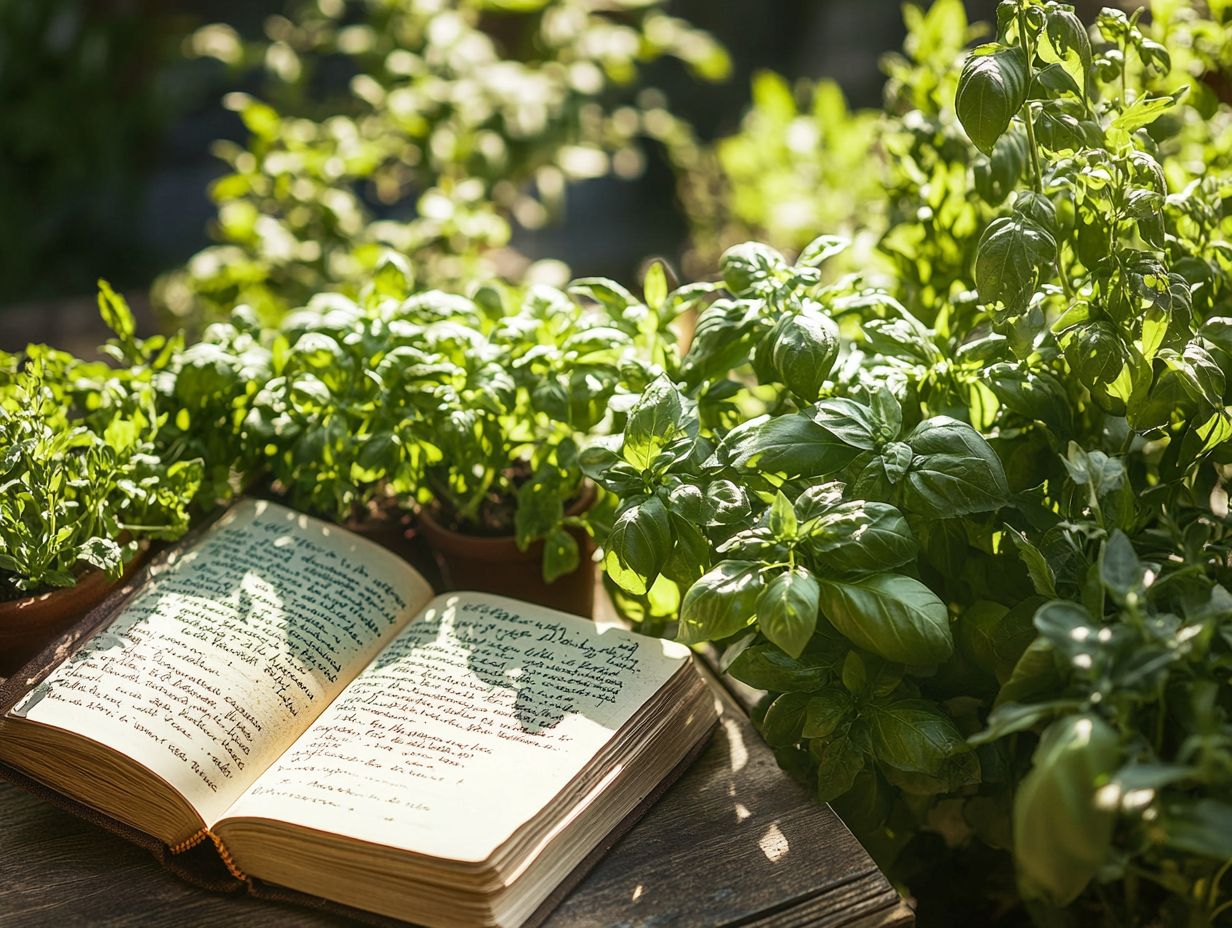
Online sources like UpToDate, PubMed, and the Review of Natural Products offer a treasure trove of information on herbal medicine. They grant you access to peer-reviewed studies, patient information, and the latest updates on herbal products. These platforms are essential for both healthcare professionals and individuals seeking trustworthy data regarding the safety and effectiveness of herbal supplements and therapeutic options.
By utilizing reputable online resources, you can confidently navigate the often complex world of herbal remedies. You can rely on solid evidence to inform your decisions. For example, a study published in PubMed Central showcases the potential benefits of turmeric in managing inflammation. UpToDate also offers comprehensive summaries on its pharmacology and contraindications.
Accessing these resources gives you the power to better understand dosage guidelines, potential interactions, and the latest research findings. This enhances your practice of evidence-based herbal medicine and helps minimize the risks associated with unverified treatments. For those interested in expanding their knowledge, learning how to learn about herbal medicine online can be incredibly beneficial.
Classes and Workshops
Participating in classes and workshops offers you a unique opportunity for hands-on experience and comprehensive training in the realm of herbal supplements and medicines. These educational experiences explore the therapeutic applications of various herbs, helping you understand better their benefits and uses. For instance, you might learn about Echinacea and Ginkgo biloba.
You can choose from structured classes, ranging from introductory sessions that cover the essentials of herbal properties to advanced workshops focusing on specific modalities like tincture preparation which are concentrated herbal extracts often used in natural remedies or herbal formulation.
Guided by expert instructors often seasoned herbalists or practitioners with extensive experience these workshops provide invaluable insights into the practical applications of herbal therapies. You will acquire not just theoretical knowledge but also essential hands-on experience, mastering the skills to identify, harvest, and prepare herbs with confidence.
This hands-on experience boosts your confidence in using herbal remedies effectively! Imagine preparing your own herbal tea with ingredients you ve learned about in class!
Choosing Reliable and Credible Sources
When you delve into herbal knowledge, it’s essential to select reliable and credible sources. The quality of the information you encounter can profoundly influence your understanding of herbal products and their therapeutic applications.
By carefully evaluating sources for accuracy, scientific support, and adherence to FDA regulations, you can cultivate a well-informed approach to herbal medicine. This allows you to navigate potential drug interactions with confidence.
Factors to Consider
When evaluating the reliability of herbal resources, consider several factors. First, check if clinical studies exist that support the claims made about herbal products. Pay attention to the qualifications of the author or organization providing the information. Look for patient information that aligns with the latest research and guidelines.
It s essential to examine if the information is grounded in peer-reviewed research, offering a solid scientific basis for the claims presented. Seek endorsements from experts in herbal medicine, as these significantly bolster credibility. Reputable sources, such as the National Center for Complementary and Integrative Health (NCCIH), provide detailed insights and evidence that you can trust.
Cross-referencing information can further enhance your assessment of reliability. By comparing findings from academic journals with data from health organizations, you can cultivate a more comprehensive perspective. Transparency in data such as the disclosure of funding sources and potential conflicts of interest is crucial in evaluating the integrity of herbal information.
Start exploring these resources today!
Benefits of Learning Herbal Knowledge
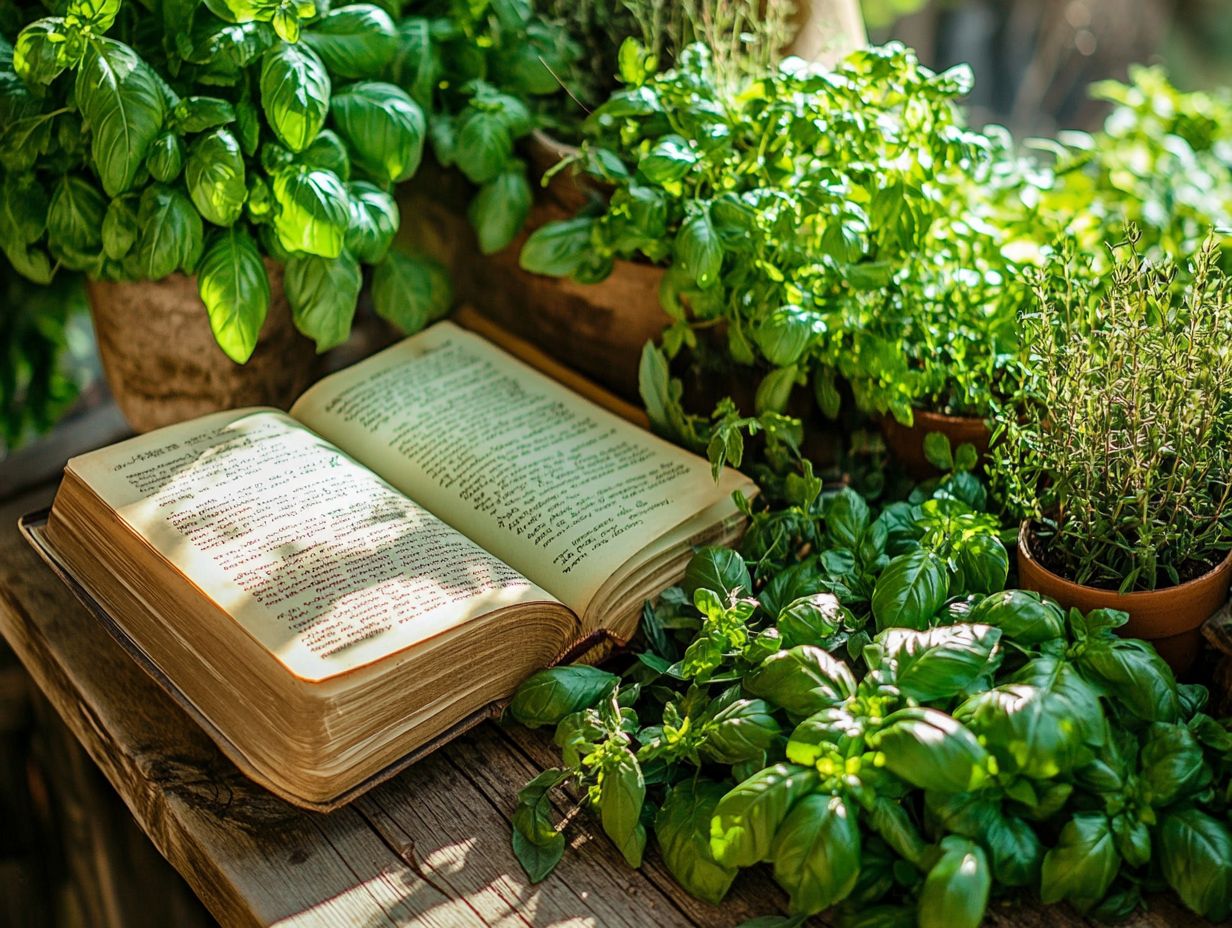
Learning about herbs offers numerous benefits. You ll understand how herbal supplements can improve health and boost your immune system. This insight elevates your approach to complementary therapies.
By integrating this knowledge into your health practices, you can harness the healing benefits of plants like garlic and St. John’s wort with remarkable effectiveness.
Improving Health and Well-being
The therapeutic use of herbal supplements can greatly enhance your health and well-being. By supporting your immune system and promoting overall wellness, you can improve your quality of life.
Consider herbs like Ashwagandha, known for helping your body manage stress effectively. Turmeric, with its powerful anti-inflammatory properties, may also reduce chronic pain and alleviate joint issues. These herbs work through various mechanisms whether modulating immune responses or reducing oxidative stress making them essential for a holistic wellness approach.
Incorporating Ginger into your diet can assist with digestion and enhance circulation, contributing to a greater sense of vitality. Understanding how these herbs interact with your body helps you make informed choices that lead to improved health and a well-balanced lifestyle.
Tips for Retaining Herbal Knowledge
Want to keep your herbal knowledge sharp? Use practical techniques that make learning fun and effective. This includes understanding the therapeutic uses of various plants and mastering the proper administration of herbal supplements.
Utilizing mnemonic devices, engaging in consistent practice, and committing to ongoing education can significantly enhance your retention of this valuable information.
Practical Applications and Techniques
Understanding the practical applications of herbal medicine is essential for effectively using herbal supplements in your daily life. This journey involves mastering how to prepare, dose, and integrate these remedies safely.
You might explore techniques like crafting tinctures, brewing teas, and creating extracts, all while learning about the individual therapeutic uses of various plants. Tinctures are concentrated herbal extracts made by soaking herbs in alcohol or vinegar.
It’s also important to recognize how different herbs can target specific health concerns. For instance, calming herbs like chamomile can help ease stress, while invigorating herbs such as ginseng may boost energy levels.
As you embark on this herbal journey, assess your personal health history and current conditions. This will help tailor your herbal choices, ensuring remedies complement existing treatments rather than interfere with them.
Employ safe preparation techniques and be aware of potential interactions and contraindications. This empowers you to incorporate herbal practices into your wellness routines with confidence, enhancing your overall therapeutic experience.
Frequently Asked Questions
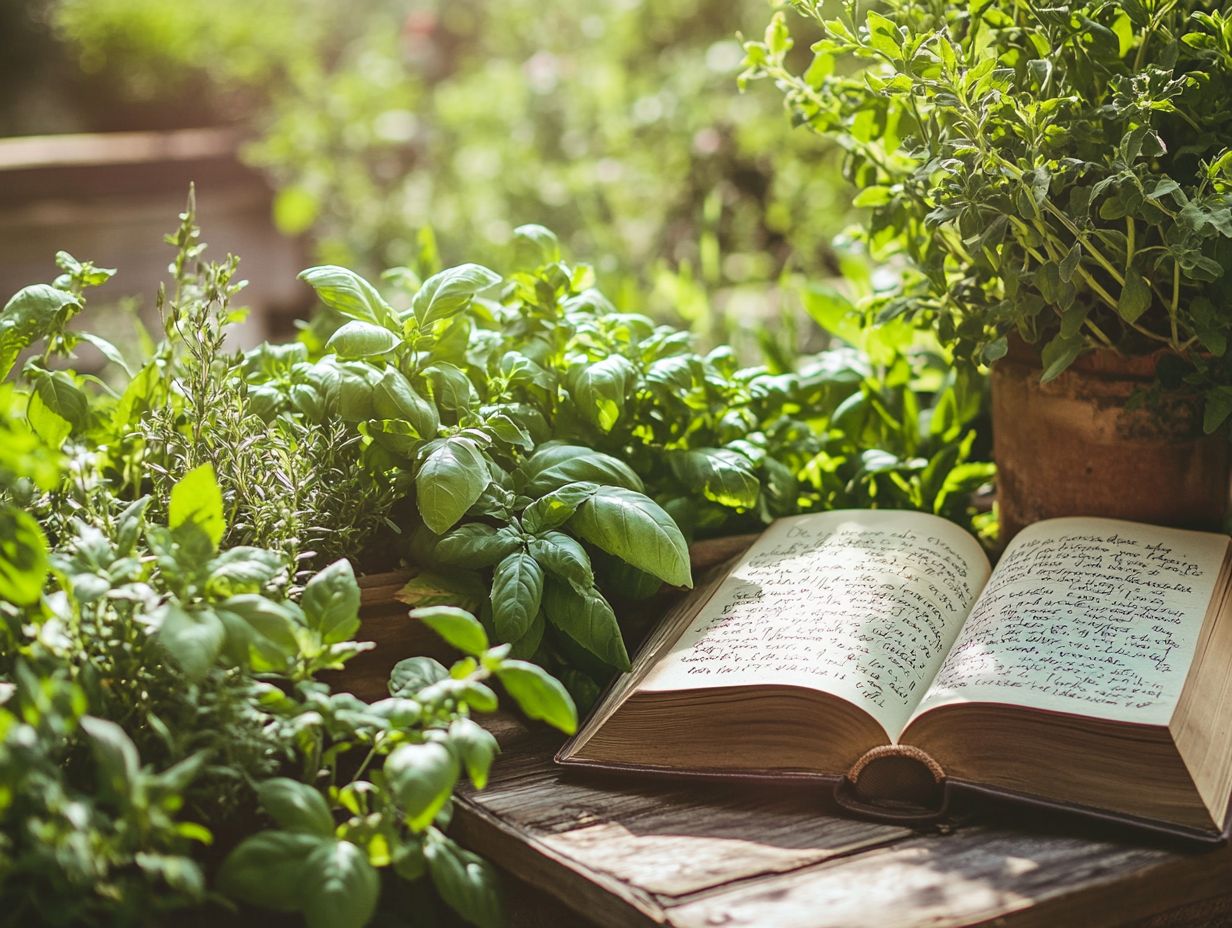
What are the best resources for herbal knowledge?
Some of the best resources for herbal knowledge include books, online articles and blogs, classes or workshops, experienced herbalists, and libraries or educational institutions.
How can I find reliable information about herbs?
One of the best ways to find reliable information about herbs is to consult reputable sources such as government agencies, educational institutions, or professional herbal organizations.
Are there any online courses or workshops available for learning about herbs?
Yes, there are many online courses and workshops available that offer comprehensive and reliable information about herbs, including their uses and preparations.
For more insights and experiences with herbal knowledge, feel free to share your thoughts or explore additional resources!
Where can I find books about herbal knowledge?
You can find books about herbal knowledge in libraries, bookstores, or online stores. Consider borrowing from experienced herbalists or joining online book clubs focused on herbalism.
Can I trust information from online articles and blogs about herbs?
There is valuable information about herbs online. However, verify the credibility of the source. Stick to reputable websites or blogs by experienced herbalists.
How can I learn about herbs from experienced herbalists?
Attend workshops or classes led by experienced herbalists. You can also hire them as mentors or join herbalism communities to connect and seek guidance.

